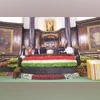Constitution our 'guiding light', 'living stream': PM Narendra Modi
PM says his govt has strengthened constitutional values by implementing welfare measures
)
Listen to This Article
Speaking on the occasion of the 75th year of the adoption of India’s Constitution, Prime Minister Narendra Modi on Tuesday described the document as a “guiding light” and a "living stream".
The Prime Minister, at Constitution Day celebrations organised by the Supreme Court Bar Association (SCBA) at the apex court, said that his government had over the past 10 years strengthened constitutional values by implementing welfare measures aimed at achieving social and financial equality. The sentiment of “nation first” would keep the Constitution alive for centuries to come, he added.
Modi highlighted that the Constitution had now been fully implemented in Jammu & Kashmir, where Constitution Day was celebrated for the first time. He also mentioned that the original edition of the calligraphed Constitution features pictures of Lord Ram, Sita, Guru Nanak, Buddha, and Mahavir, pointing out that the framers of the Constitution included these figures to remind citizens of fundamental human values. Speaking in a lighter vein, he concluded his speech by saying: “I have not tried to encroach upon the judiciary’s domain. I have tried to put forward my views within “maryada”. Only a hint is enough here; there is no need to say much.”
Constitution Day celebrations across India
Constitution Day was celebrated across the country’s legislative Assemblies, as well as Parliament, where President Droupadi Murmu addressed a joint sitting of the two Houses. In her speech, Murmu acknowledged the contribution of the 15 women members of the 389-member Constituent Assembly who played a role in framing the Constitution.
Also Read
The Congress party held the ‘Samvidhan Rakshak Abhiyan’ at Delhi’s Talkatora Stadium. During the event, Congress leader Rahul Gandhi accused Prime Minister Modi and the Rashtriya Swayamsevak Sangh (RSS) of strengthening the walls that obstructed the progress of Dalits, Adivasis, and Other Backward Classes (OBCs). He also said that the Congress-led United Progressive Alliance (UPA) government had attempted to dismantle these barriers through various policies, including the amendment of the Land Acquisition Act, the Right to Food Act, and the Mahatma Gandhi National Rural Employment Guarantee Scheme. “When I look back, I can say the UPA government did not weaken the wall to the extent it should have. It did not do it as strongly as it should have,” Rahul said.
Rahul Gandhi also remarked that the Constitution echoes the voices of figures like Mahatma Gandhi, B R Ambedkar, Gautam Buddha, and Jyotirao Phule, but does not reflect the views of V D Savarkar. “It is not written anywhere in the Constitution that... violence must be used, that one should kill or intimidate someone, or that the government should be run by telling lies. This is because the Constitution is a book of truth and non-violence,” he added.
Opposition demands debate on Constitution
Opposition leaders on Tuesday called for a debate on the Constitution in both Houses of Parliament, citing recent developments in the country. Leader of Opposition in the Rajya Sabha Mallikarjun Kharge said he and his Lok Sabha counterpart Rahul Gandhi had written to the chair in both Houses requesting a two-day discussion on the Constitution.
Supreme Court event
The Constitution Day event at the Supreme Court was also addressed by Chief Justice of India (CJI) Sanjiv Khanna, Law Minister Arjun Ram Meghwal, SCBA President Kapil Sibal, among others.
CJI Khanna stressed: “The Constitution by design insulates the judiciary from the ebbs and flows of the electoral process. This ensures decisions are unbiased, free from ill-will, and guided solely by the Constitution and laws. At the same time, each branch of the government is not a satellite in an independent orbit but rather a related actor that works in a degree of separateness. Each branch must honour its constitutionally assigned distinct role by nurturing inter-institutional equilibrium. Judicial independence does not serve as a high wall but as a catalyst.”
Khanna also noted the staggering scale of cases flowing through Indian courts. During this year alone, the judicial system received over 28 million cases in district courts, about 1.66 million cases in high courts, and 54,000 cases in the Supreme Court. “Therefore, it is not surprising that there are more than 45.4 million cases pending in district courts and 6.1 million cases in high courts. These numbers reflect the challenge and represent the deep trust citizens place on our courts,” he said.
More From This Section
Topics : Narendra Modi Constitution Supreme Court
Don't miss the most important news and views of the day. Get them on our Telegram channel
First Published: Nov 26 2024 | 10:30 PM IST
